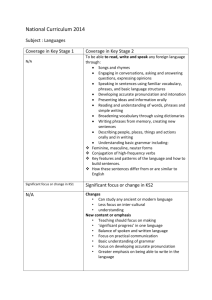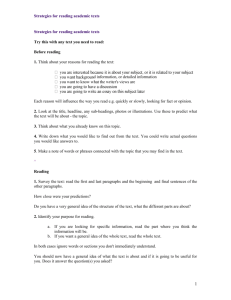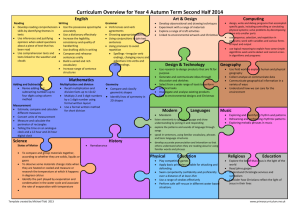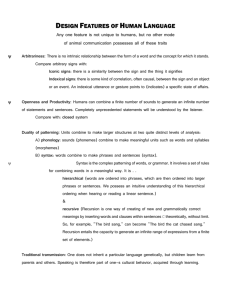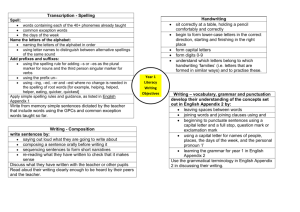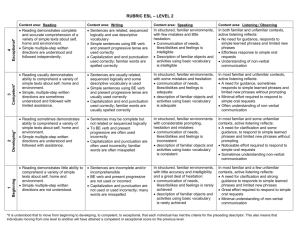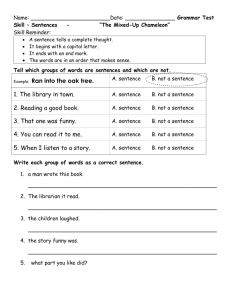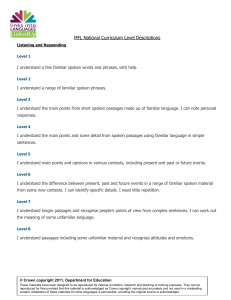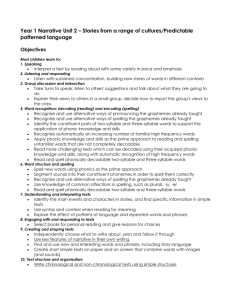NATIONAL CURRICULUM LEVELS * KS3 LANGUAGES
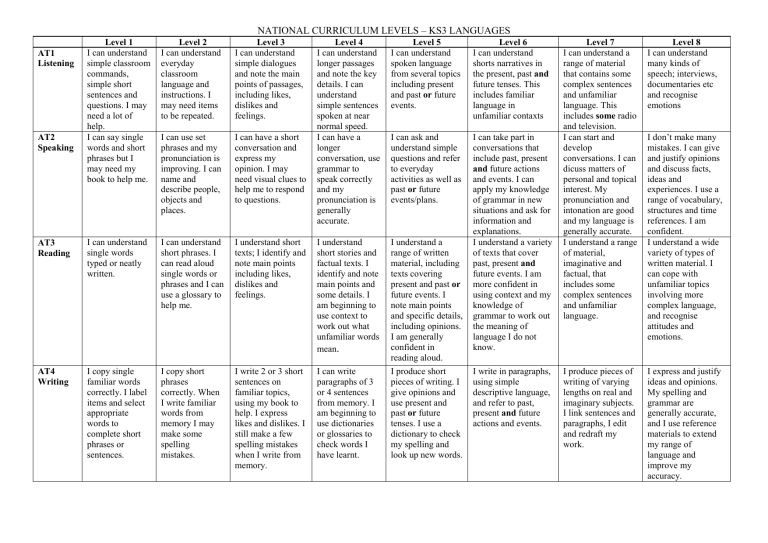
AT1
Listening
AT2
Speaking
AT3
Reading
AT4
Writing
Level 1
I can understand simple classroom commands, simple short sentences and questions. I may need a lot of help.
I can say single words and short phrases but I may need my book to help me.
Level 2
I can understand everyday classroom language and instructions. I may need items to be repeated.
I can use set phrases and my pronunciation is improving. I can name and describe people, objects and places.
I can understand single words typed or neatly written.
I copy single familiar words correctly. I label items and select appropriate words to complete short phrases or sentences.
I can understand short phrases. I can read aloud single words or phrases and I can use a glossary to help me.
I copy short phrases correctly. When
I write familiar words from memory I may make some spelling mistakes.
NATIONAL CURRICULUM LEVELS – KS3 LANGUAGES
Level 3
I can understand simple dialogues and note the main points of passages, including likes, dislikes and feelings.
I can have a short conversation and express my opinion. I may need visual clues to help me to respond to questions.
I understand short texts; I identify and note main points including likes, dislikes and feelings.
Level 4
I can understand longer passages and note the key details. I can understand simple sentences spoken at near normal speed.
I can have a longer conversation, use grammar to speak correctly and my pronunciation is generally accurate.
I understand short stories and factual texts. I identify and note main points and some details. I am beginning to use context to work out what unfamiliar words mean .
Level 5
I can understand spoken language from several topics including present and past or future events.
I can ask and understand simple questions and refer to everyday activities as well as past or future events/plans.
I understand a range of written material, including texts covering present and past or future events. I note main points and specific details, including opinions.
I am generally confident in reading aloud.
Level 6
I can understand shorts narratives in the present, past and future tenses. This includes familiar language in unfamiliar contaxts
I can take part in conversations that include past, present and future actions and events. I can apply my knowledge of grammar in new situations and ask for information and explanations.
I understand a variety of texts that cover past, present and future events. I am more confident in using context and my knowledge of grammar to work out the meaning of language I do not know.
I write 2 or 3 short sentences on familiar topics, using my book to help. I express likes and dislikes. I still make a few spelling mistakes when I write from memory.
I can write paragraphs of 3 or 4 sentences from memory. I am beginning to use dictionaries or glossaries to check words I have learnt.
I produce short pieces of writing. I give opinions and use present and past or future tenses. I use a dictionary to check my spelling and look up new words.
I write in paragraphs, using simple descriptive language, and refer to past, present and future actions and events.
I produce pieces of writing of varying lengths on real and imaginary subjects.
I link sentences and paragraphs, I edit and redraft my work.
Level 7
I can understand a range of material that contains some complex sentences and unfamiliar language. This includes some radio and television.
I can start and develop conversations. I can dicuss matters of personal and topical interest. My pronunciation and intonation are good and my language is generally accurate.
I understand a range of material, imaginative and factual, that includes some complex sentences and unfamiliar language.
Level 8
I can understand many kinds of speech; interviews, documentaries etc and recognise emotions
I don’t make many mistakes. I can give and justify opinions and discuss facts, ideas and experiences. I use a range of vocabulary, structures and time references. I am confident.
I understand a wide variety of types of written material. I can cope with unfamiliar topics involving more complex language, and recognise attitudes and emotions.
I express and justify ideas and opinions.
My spelling and grammar are generally accurate, and I use reference materials to extend my range of language and improve my accuracy.
